Complete Solutions to SECTION-B of chapter REPRODUCTION of Class 12 book with complete answers and questions
| Class 12 | BIOLOGY |
| Chapter | REPRODUCTION |
| TRUEMAN BIOLOGY | SECTION-B |
| Number Of Questions | 39 |
| Academic Year | 2023-24 |
Indentify the type of flower shown in A and B. Which out of the two will produce an assured seed set ?
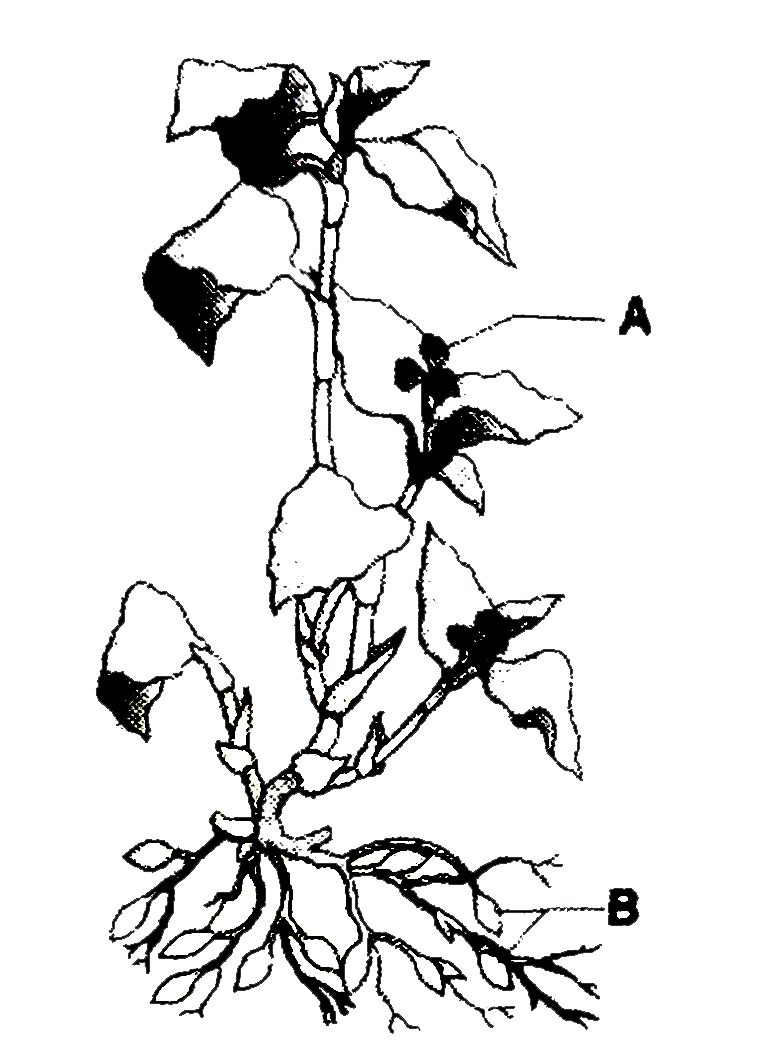
View SolutionIn the T.S. of a mature anther given below, identify 'A' and 'B' and mention their function.
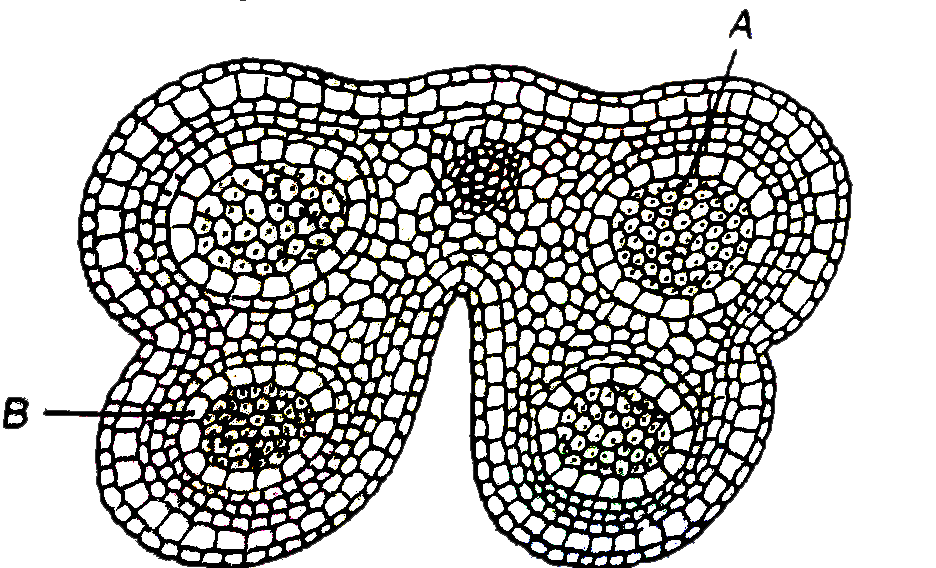
View SolutionIn the table given below , select and enter one correct device out of the following : Oral pill, condom , Copper T , Saheli,Vasectomy, Diaphragm, Tubectomy, Cervical cap

View SolutionGiven below is an incomplete flow chart showing influence of hormones on gametogenesis in males. Observe the flow chart carefully and fill in the blanks A,B,C and D.
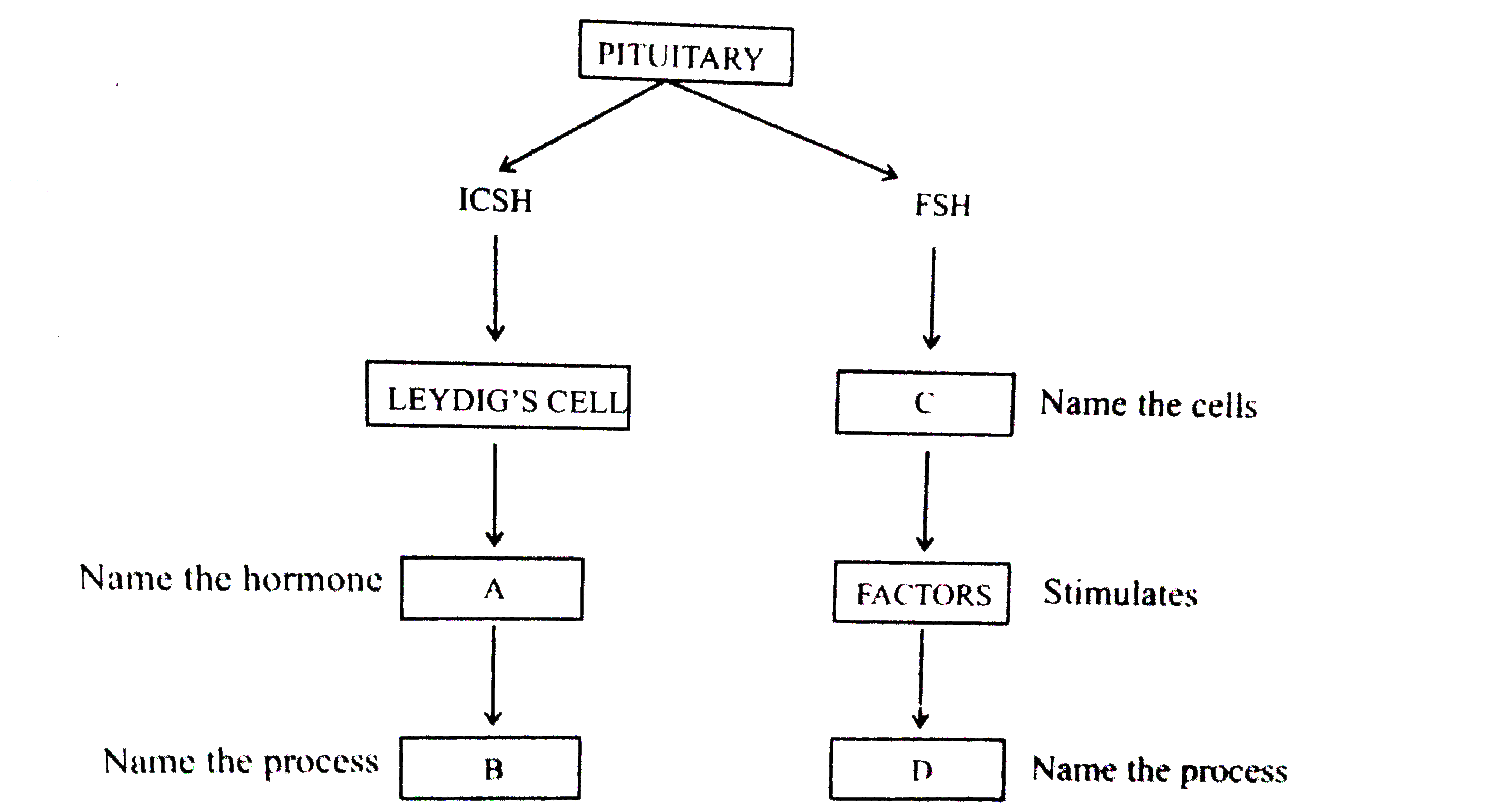
View SolutionStudy the figure given below and answer the questions that follow :
(a)Name the stage of human embryo the figure represents.
(b)Identify 'A' in the figure and mention its function .
( c )Mention the fate of the inner cell mass after implantation in the uterus .
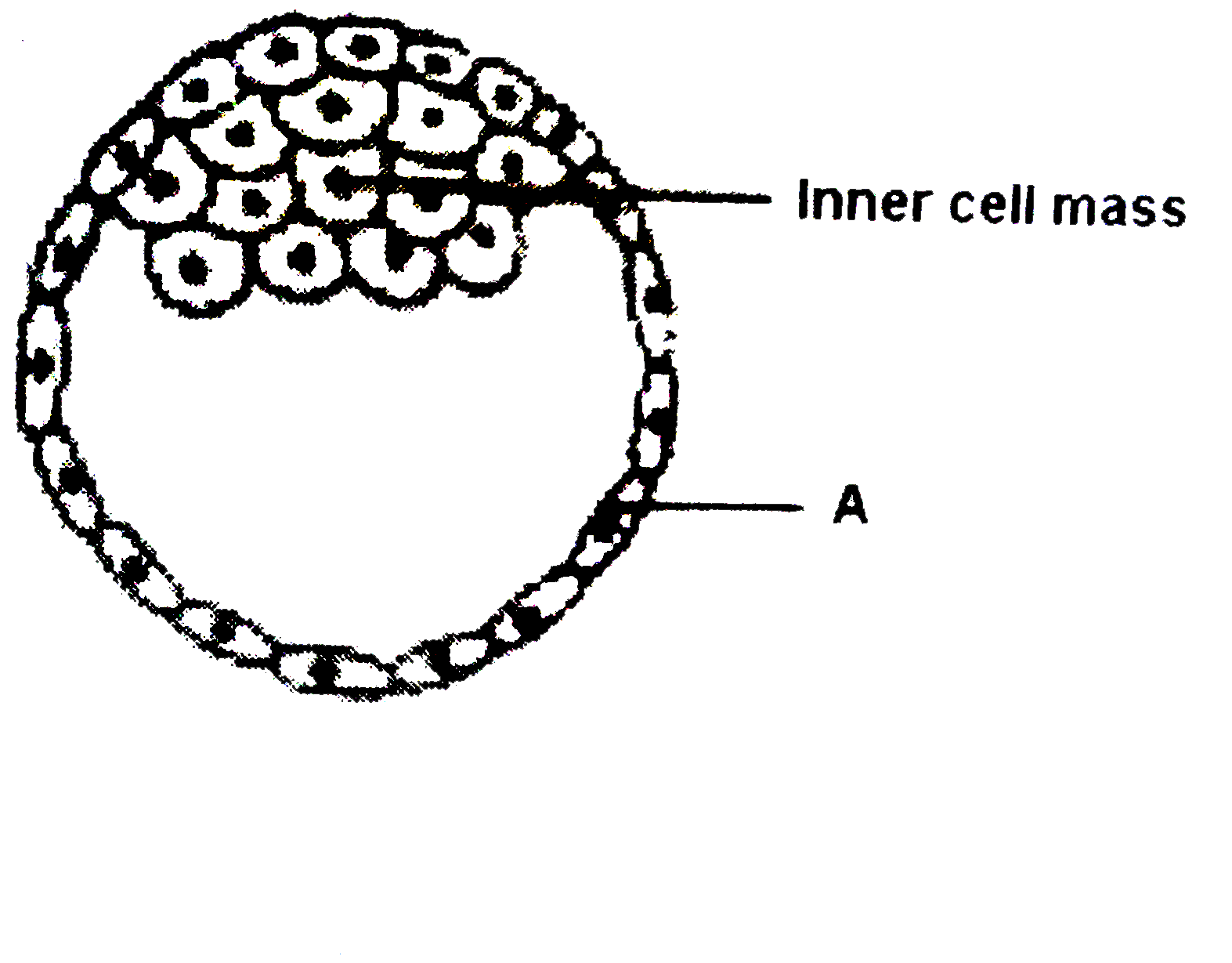
(d)Where are the stem cells located in this embryo ?
View SolutionDraw a vertical section of a maize grain and label (i) pericarp, (ii)scutellum, (iii)coleoptile, and (iv) radicle
View SolutionWhy do some women used "Saheli" pills ?
View SolutionEven though each pollen grain has two male gametes, why are at least 10 pollen grains and not 5 pollen grains required to fertilise 10 ovules present in a particular carpel ?
View SolutionWhy is an apple called a false fruit and banana a parthenocarpic fruit ? Explain
View SolutionExplain how geitonogamy is functionally similar to cross pollination and genetically similar to self pollination ?
View SolutionName any two copper releasing Intra Devices (IUDs).List two reasons that make them effective contraceptives .
View SolutionIf you squeeze a seed of orange you might observe many embryos of different sizes. How it possible ? Explain.
View SolutionDifferentiate between menarche and menopause.
View SolutionDifferentiate between major structural changes in the human ovary during the follicular and luteal phase of the menstrual cycle.
View SolutionExplain the zygote intra fallopian transfer technique ZIFT. How is intrauterin e transfer technique (IUT) different from it
View Solution(i)Given below is a T.S. of an apple. Identify a,b and C
(ii)Why is an apple considered as a false fruit ?
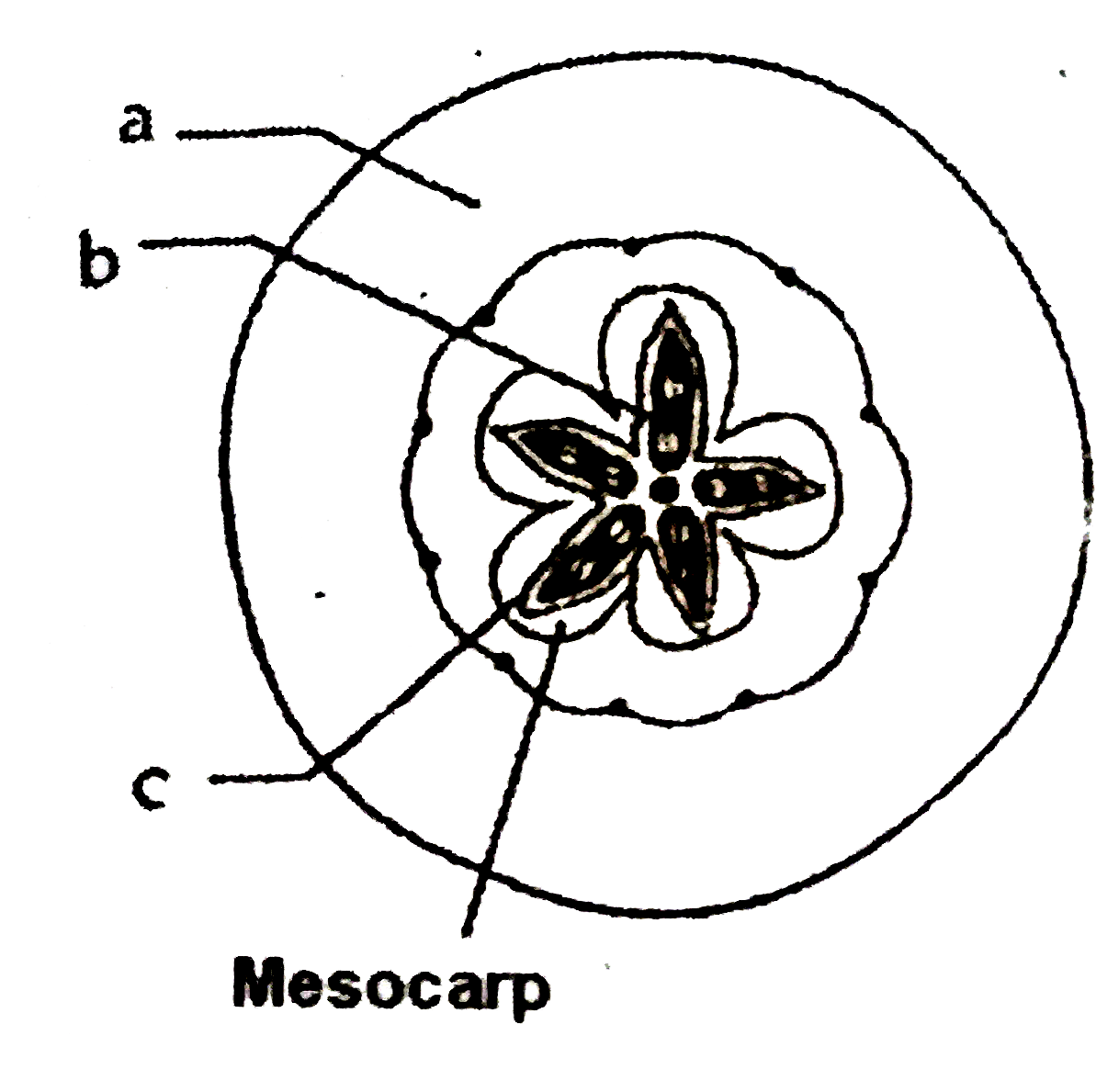
View SolutionA fertilized egg is blue print of future development. Explain
View SolutionDescribe the Lactational Amenorrhea method of birth control
View SolutionA moss plant produces a large number of antherozoids but relatively only a few egg cells. Why ?
View SolutionMention the reasons for difference in ploidy of zygote and primary endosperm nucleus in an angiosperm.
View SolutionHow many haploid cells are present in matue female gametophyte of a flowering plant? Name them.
View SolutionPlacenta acts as an endocrine tissue. Justify.
View SolutionThe number of taxa exhibiting asexual reproduction is drastically reduced in higher plants (angiosperms) and higher animals (vertebrates) as compared with lower groups of plants and animals. Analyse the possible reasons for this situation.
View SolutionDraw the sketch of a zoospore and a conidium. Mention two dissimilarities between them and atleast one feature common to both structures.
View SolutionGiven below are the events that are observed in an artificial hybridization programme. Arrange them in the correct sequential order in which they are followed in the hybridization programme. (a)re-bagging , (b)selection of parents , (c )bagging , (d)dusting the pollen on stigma , (e)emasculation , (f)collection of pollen from male parent.
View SolutionWhy does the zygote begin to divide only after the division of primary Endosperm cell (PEC)?
View SolutionCorpus luteum in pregnancy has a long life. However if fertilisation does not take place, it remains active only for 10-12 days. Explain.
View SolutionWhat are the events that take place in the ovary and uterus during follicular phase of the menstrual cycle.
View SolutionGiven below is a flow chart showing ovarian changes during menstrual cycle. Fill in the space with the hormonal factor / responsible for the events shown .
View SolutionIn GIFT, gametes are transferred to the fallopian tube. Can gametes be transferred to the uterus to achieve the same result ? Explain
View SolutionBriefly explain IVF and ET, What are the conditions in which these methods are advised?
View SolutionAll reproductive tract infections RTIs are STDs, but all STDs but all STDs are not RTIs. Justify with example
View SolutionWhat do you understand by amniocentesis ? Why is there a statutory ban on this ? Give reason
View SolutionWhen and where do chorionic villi appear in humans ? State their function.
View Solution(a) How does cleistogamy ensure autogamy?
(b) State one advantage and one disadvantage of cleistogamy to the plant.
View SolutionExplain the steps that ensure cross pollination in an autogamous flower.
View SolutionName all the haploid cells present in an unfertilized mature embryo-sac of a flowering plant. Write the total number of cells in it.
View SolutionDifferentiate between the two cells enclosed in a mature male gaemetophyte of an angiosperm.
View SolutionExplain the hormonal regulation of the process of spermatogensis in humans.
View Solution
SECTION-B questions and complete solutions for chapter REPRODUCTION of TRUEMAN BOOK COMPANY BIOLOGY (HINGLISH) of Class 12